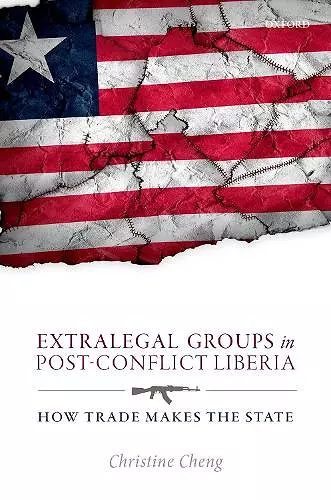Extralegal Groups in Post-Conflict Liberia
How Trade Makes the State
Format:Hardback
Publisher:Oxford University Press
Published:7th Jun '18
Currently unavailable, and unfortunately no date known when it will be back

Winner of the 2019 Conflict Research Society Book of the Year Prize
This book examines how the economic survival strategies of former fighters in Liberia can help explain the trajectories of war-to-peace transitions.In the aftermath of the Liberian civil war, groups of ex-combatants seized control of natural resource enclaves in the rubber, diamond, and timber sectors. With some of them threatening a return to war, these groups were widely viewed as the most significant threats to Liberia's hard-won peace. Building on fieldwork and socio-historical analysis, this book shows how extralegal groups are driven to provide basic governance goods in their bid to create a stable commercial environment. This is a story about how their livelihood strategies merged with the opportunities of Liberia's post-war political economy. But it is also a context-specific story that is rooted in the country's geography, its history of state-making, and its social and political practices. This volume demonstrates that extralegal groups do not emerge in a vacuum. In areas of limited statehood, where the state is weak and political authority is contested, where rule of law is corrupted and government distrust runs deep, extralegal groups can provide order and dispute resolution, forming the basic kernel of the state. This logic counters the prevailing 'spoiler' narrative, forcing us to reimagine non-state actors and recast their roles as incidental statebuilders in the evolutionary process of state-making. This leads to a broader argument: it is trade, rather than war, that drives contemporary statebuilding. Along the way, this book poses some uncomfortable questions about what it means to be legitimately governed, whether our trust in states is ultimately misplaced, whether entrenched corruption is the most likely post-conflict outcome, and whether our expectations of international peacebuilding and statebuilding are ultimately self-defeating.
This book is highly recommended to scholars and policymakers interested in grappling with the fuzzy lines between state/non-state, licit/illicit, political/economic, and even war and peace. Rather than considering these fault lines as hermetically sealed boundaries closing off our current approaches to understanding politics, Cheng effectively demonstrates how powerful forces in fact emerge from them. * Thomas Patrick Hinkel, Contemporary Voices *
This book makes several important contributions to research on peacebuilding, state formation, and non-state actors ... Through careful, qualitative research in postwar Liberia, it demonstrates that local combatant networks play essential roles in postwar stabilization -- and potentially beyond. The book thus points to the importance of extralegal groups in postwar settings, and suggests that both researchers and peacebuilders ignore them at their peril. * Louis-Alexandre Berg, Canadian Journal of African Studies *
Chen's study is an excellent contribution to the growing literature on how extra-legal groups build state-like institutions where the 'legitimate' state is either absent or extremely weak ... Cheng brilliantly highlights how extra-legal armed groups provide the basic structures that allow market exchanges and the rule of law -- no matter how problematic -- to survive and even thrive. * Shortlisted, Canadian Political Science Association Book Prize *
Cheng's book makes important conceptual, theoretical and empirical contributions to our understanding of the emergence, development and functions of extra-legal groups thereby enriching the African politics literature and comparative politics literature more generally. * Honorable Mention, African Politics Conference Group Best Book Award *
- Winner of Winner of the 2019 Conflict Research Society Book of the Year Prize.
ISBN: 9780199673346
Dimensions: 240mm x 164mm x 29mm
Weight: 724g
384 pages